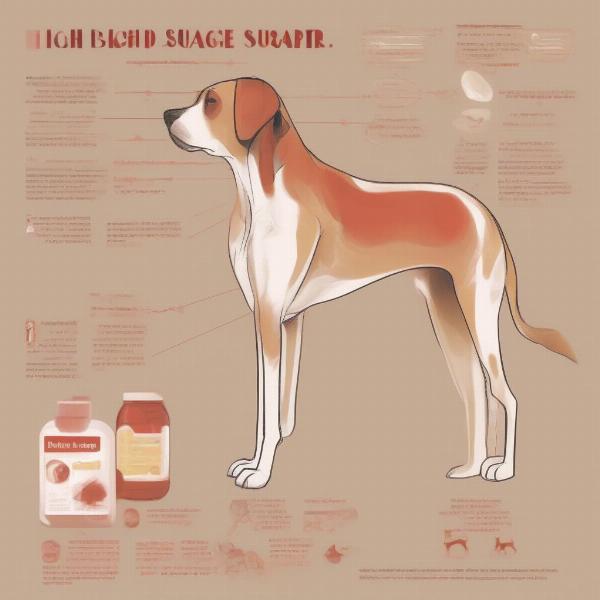Understanding your dog’s blood sugar levels is crucial for their overall health, especially if they are diabetic or at risk of developing diabetes. Knowing the normal range and what can cause fluctuations can help you identify potential problems early and ensure your furry friend receives the appropriate care. This article will delve into what a normal blood sugar reading for a dog should be, common causes of abnormal levels, and how you can help maintain your dog’s health.
Understanding Normal Blood Sugar Levels in Dogs
A dog’s normal blood glucose level typically ranges between 80 and 120 mg/dL (milligrams per deciliter). While some slight fluctuations are normal, consistently high or low levels can indicate underlying health issues. It’s important to note that factors like stress, recent meals, and certain medications can temporarily affect blood sugar readings.
Regular veterinary checkups are vital for monitoring your dog’s blood sugar, particularly as they age or if they have risk factors for diabetes.
Causes of High Blood Sugar (Hyperglycemia) in Dogs
High blood sugar, also known as hyperglycemia, can be caused by various factors, the most common being diabetes mellitus. This condition occurs when the body doesn’t produce enough insulin or doesn’t use it effectively. Other potential causes include pancreatitis, Cushing’s disease, and certain medications like steroids.
Symptoms of hyperglycemia can include increased thirst and urination, increased appetite, weight loss, lethargy, and cataracts. If your dog displays any of these signs, consult your veterinarian immediately.
 High Blood Sugar Symptoms in Dogs
High Blood Sugar Symptoms in Dogs
Early diagnosis and treatment are essential to manage hyperglycemia and prevent serious complications.
Causes of Low Blood Sugar (Hypoglycemia) in Dogs
Low blood sugar, or hypoglycemia, can be just as dangerous as high blood sugar. It can occur due to insulin overdose in diabetic dogs, strenuous exercise, liver disease, Addison’s disease, and certain tumors.
Symptoms of hypoglycemia include weakness, tremors, seizures, collapse, and even coma. If you suspect your dog has low blood sugar, offer them a small amount of honey or corn syrup and immediately seek veterinary attention.
Maintaining Healthy Blood Sugar Levels in Your Dog
A healthy diet and regular exercise are crucial for maintaining healthy blood sugar levels in your dog. For diabetic dogs, consistent insulin injections and regular blood glucose monitoring are essential. Work closely with your veterinarian to create a tailored management plan.
Conclusion
Monitoring your dog’s blood sugar is a vital part of responsible pet ownership. Understanding the normal range and recognizing the signs of high or low blood sugar can help you take proactive steps to ensure your dog’s well-being. Regular veterinary checkups and a healthy lifestyle can go a long way in preventing and managing blood sugar-related issues.
FAQ
- What are the normal blood sugar levels for a dog? A dog’s normal blood sugar levels typically range between 80 and 120 mg/dL.
- What are the signs of high blood sugar in dogs? Increased thirst, increased urination, increased appetite, weight loss, lethargy, and cataracts.
- What are the signs of low blood sugar in dogs? Weakness, tremors, seizures, collapse, and coma.
- What should I do if my dog has low blood sugar? Offer them a small amount of honey or corn syrup and immediately seek veterinary attention.
- How can I maintain healthy blood sugar levels in my dog? A healthy diet, regular exercise, and consistent veterinary care are crucial.
- What causes diabetes in dogs? Diabetes occurs when the body doesn’t produce enough insulin or doesn’t use it effectively.
- How is diabetes in dogs treated? Treatment typically involves regular insulin injections, dietary management, and regular blood glucose monitoring.
ILM Dog is a leading international pet website dedicated to providing expert advice on dog care and wellbeing. We offer valuable resources on a variety of topics, including breed selection, health and medical care, training and behavior, nutrition, grooming, and much more. For expert advice tailored to your dog’s specific needs, please contact us via email at [email protected] or phone at +44 20-3965-8624. ILM Dog is committed to helping you provide the best possible care for your canine companion.